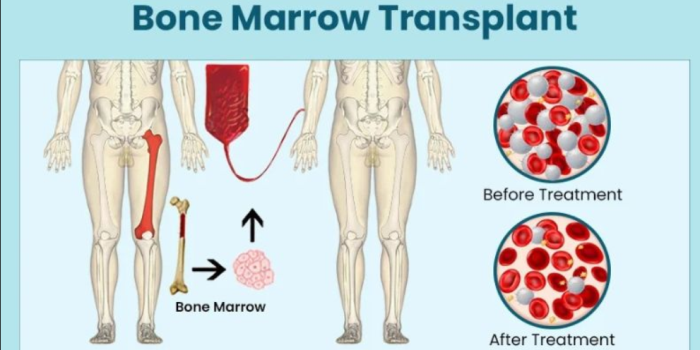Introduction to the Pre-Transplant Journey
The pre-transplant journey for bone marrow transplantation is a critical phase that ensures both the patient and the medical team are adequately prepared for the procedure. This stage involves a comprehensive evaluation of the patient's health, psychological readiness, and support system. It helps in identifying potential risks and creating a tailored plan to maximize the chances of a successful transplant. By addressing every detail during this period, the process builds a strong foundation for a smooth and effective recovery post-transplantation.
What is Bone Marrow Transplantation?
Bone marrow transplantation is a medical procedure that involves replacing damaged or diseased bone marrow with healthy stem cells. This treatment is commonly used for conditions like leukemia, lymphoma, and aplastic anemia. There are two main types of transplants: autologous, where the patient’s own stem cells are used, and allogeneic, which involves a donor. The process restores the body’s ability to produce healthy blood cells, offering patients a chance at long-term remission or cure.

The Importance of the Pre-Transplant Process
The pre-transplant process is vital for the success of a bone marrow transplant. It ensures that the patient is physically, emotionally, and medically ready for the procedure. This stage identifies potential complications, optimizes the patient's health, and aligns the treatment with their unique medical history. It also allows for the creation of a personalized plan to mitigate risks, making the transplant safer and more effective.
Key Phases in Pre-Transplant Preparation
Pre-transplant preparation is divided into several key phases, starting with a thorough medical evaluation to determine eligibility. Next is the identification of a suitable donor through HLA matching, followed by the conditioning regimen involving chemotherapy or radiation. This is coupled with psychological assessments, nutritional planning, and infection control strategies. Each phase is designed to prepare the patient’s body and mind for the procedure while minimizing risks.
Understanding the Patient Evaluation Process
Patient evaluation is a cornerstone of the pre-transplant process and involves a detailed assessment of medical history, physical health, and potential risk factors. Doctors perform various tests, including blood work, imaging, and organ function evaluations, to determine the patient’s eligibility. This step helps in identifying pre-existing conditions or vulnerabilities that could impact the transplant's success.
Diagnostic Tests Before Bone Marrow Transplant
Diagnostic tests are essential to gauge a patient’s readiness for a bone marrow transplant. These include complete blood counts, kidney and liver function tests, and imaging studies like CT or MRI scans. Bone marrow biopsies may also be performed to assess the disease's status. These tests ensure that the patient is in optimal health and can tolerate the transplant procedure.
Role of Blood Work and Organ Function Tests
Blood work and organ function tests play a critical role in the pre-transplant phase by providing a comprehensive view of the patient’s health. Blood tests measure levels of white and red blood cells, platelets, and markers for infections or clotting issues. Simultaneously, kidney and liver function tests assess the organs' ability to handle the conditioning regimen and medications used during the transplant.
Imaging Tests and Their Importance
Imaging tests, such as X-rays, CT scans, and MRIs, are pivotal in the pre-transplant process. These tests help detect any hidden infections, abnormalities, or conditions that could complicate the transplant. For instance, a chest X-ray may reveal lung issues, while an MRI can provide a detailed view of organs and tissues. These findings guide the medical team in preparing a safe and effective treatment plan.
The Role of Psychological Assessments
Psychological assessments are an integral part of pre-transplant preparation, addressing the emotional and mental readiness of the patient. Coping with a transplant can be overwhelming, and these evaluations identify potential stressors, depression, or anxiety. Counseling services and support groups are often recommended to help patients build resilience and maintain a positive outlook throughout their journey.
Preparing for Bone Marrow Transplant: Step-by-Step
Preparing for a bone marrow transplant involves a systematic approach, starting with medical evaluations and diagnostic tests. Once deemed eligible, patients undergo HLA matching to find a suitable donor. This is followed by the conditioning regimen, nutritional adjustments, and infection control measures. Education sessions and consultations with specialists ensure that patients and their families are well-informed and ready for the procedure.
The Role of HLA Typing in Donor Matching
HLA typing is a critical process in identifying a compatible donor for bone marrow transplantation. It involves matching human leukocyte antigens between the donor and recipient to minimize rejection risks. The closer the match, the better the chances of a successful transplant. Advanced techniques in HLA typing now provide high-resolution results, improving compatibility outcomes.
Finding a Compatible Donor: Family vs. Registry
A compatible donor can be found either within the patient’s family or through donor registries. Family members, especially siblings, often have a higher probability of being a match. However, in cases where no family match is available, global donor registries offer a vast pool of unrelated volunteers, significantly expanding the options.
Cord Blood as an Alternative to Bone Marrow
Cord blood, collected from a newborn’s umbilical cord, is a valuable source of stem cells for transplantation. It offers advantages such as reduced risk of graft-versus-host disease (GVHD) and does not require perfect HLA matching. However, the limited cell quantity may restrict its use to children or small adults.
What is a Conditioning Regimen?
The conditioning regimen is a preparatory step that involves high-dose chemotherapy and, in some cases, radiation therapy. Its purpose is to eliminate diseased bone marrow, suppress the immune system to prevent rejection, and create space for new stem cells. This phase is critical to the success of the transplant but may lead to temporary side effects like fatigue and nausea.
Understanding Chemotherapy and Radiation in Preparation
Chemotherapy and radiation therapy are used during the conditioning phase to eradicate abnormal cells and prepare the body for new stem cells. While effective, they also carry risks such as weakened immunity and organ damage. Advances in targeted treatments are now being explored to reduce side effects while maintaining efficacy.

Common Risks During the Pre-Transplant Phase
Patients undergoing the pre-transplant phase face several risks, including infections, organ complications, and side effects from the conditioning regimen. Monitoring and preventive measures, such as prophylactic antibiotics and regular health checks, are implemented to manage these risks effectively.
Infections and How They are Managed
Infections are a major concern during the pre-transplant process due to weakened immunity. Strict hygiene protocols, prophylactic medications, and regular monitoring help mitigate these risks. Isolation units in hospitals are often used to minimize exposure to infectious agents.
Nutritional Planning Before Bone Marrow Transplant
Nutritional planning is crucial in preparing the body for a bone marrow transplant. Patients may need to adjust their diet to ensure they are receiving the proper nutrients, especially if they experience nausea or loss of appetite due to chemotherapy. Dietitians work closely with patients to create meal plans that maintain strength and support immune function.
Psychosocial Support Before the Transplant
Psychosocial support is essential during the pre-transplant phase. This support includes mental health counseling, support groups, and stress management techniques to help patients cope with the emotional burdens of the treatment. Addressing anxiety, depression, and isolation ensures that patients are mentally prepared for the challenges ahead.
How Family and Caregivers Can Prepare
Family and caregivers play a pivotal role in the pre-transplant process by providing emotional and physical support. They are trained to assist with daily tasks, monitor for complications, and offer encouragement. Preparing them for the challenges of caregiving is as essential as preparing the patient.
The Psychological Challenges of Preparing for a Transplant
The psychological challenges of preparing for a bone marrow transplant can be overwhelming. Patients may experience fear, uncertainty, and stress regarding the procedure and its outcome. Counseling and therapy can help patients and their families navigate these emotional difficulties and maintain a positive outlook throughout the process.
Financial Considerations in the Pre-Transplant Phase
Financial planning is an important aspect of pre-transplant preparation, as the costs associated with bone marrow transplantation can be significant. Patients should explore insurance coverage, financial aid programs, and other resources to ensure they can manage the costs involved in the transplant process.
Support Systems and Community Resources
Building a strong support system is vital for the patient’s recovery journey. Resources such as support groups, online communities, and patient advocacy organizations provide emotional and informational support. These systems help patients and families navigate the challenges of the transplant process.
Monitoring Health Post-Conditioning
After the conditioning regimen, patients are closely monitored for any signs of complications, such as organ failure or infections. Regular health checks, blood tests, and imaging are used to ensure that the patient is recovering well and that the body is ready to receive the transplant.
Importance of Education During Pre-Transplant
Education is a crucial aspect of the pre-transplant process. Patients and families are educated about the transplant procedure, potential risks, recovery process, and follow-up care. Knowledge empowers them to make informed decisions and reduces anxiety about the upcoming treatment.
Key Steps for Post-Surgery Recovery After a Bone Marrow Transplant
Recovery after a bone marrow transplant is critical to ensure successful integration of new cells and to avoid complications. Learn about the essential steps for post-surgery recovery, including dietary adjustments, infection prevention, and follow-up care.
Exploring the Benefits of a Successful Bone Marrow Transplant
A successful bone marrow transplant can significantly improve the quality of life by treating severe blood disorders and cancers. Discover the transformative benefits of this procedure, including restored immunity and enhanced overall health.
Transitioning to the Transplant Stage
Once the pre-transplant preparations are complete, patients transition into the actual transplant stage. This shift involves final tests and readiness assessments, with a focus on patient comfort and safety. Clear communication with the medical team ensures a smooth transition to the transplant procedure.
Role of Stem Cells in Bone Marrow Transplant
Stem cells are the core of the bone marrow transplant process, as they are responsible for regenerating the patient’s blood cells and immune system. These cells can come from various sources, including bone marrow, peripheral blood, or umbilical cord blood. The type of stem cells used influences the procedure’s success and recovery time.
Risks of Graft-Versus-Host Disease
Graft-versus-host disease (GVHD) is a serious risk in allogeneic bone marrow transplants, where the donor's immune cells attack the recipient’s tissues. Managing this condition involves careful monitoring, immunosuppressive medications, and sometimes additional treatments to minimize damage and promote healing.
Best Bone Marrow Transplant in India
The Best Bone Marrow Transplant in India is performed by expert hematologists and transplant specialists who use advanced techniques to treat conditions like leukemia, lymphoma, and other blood disorders, offering patients a tailored treatment plan focused on optimal outcomes.
Best Bone Marrow Transplant Hospitals in India
The Best Hospitals for Bone Marrow Transplant in India are equipped with cutting-edge technology and specialized transplant units, providing comprehensive care, from pre-transplant evaluations to post-transplant support, ensuring a successful and smooth recovery process.
Bone Marrow Transplant Cost in India
When considering the Bone Marrow Transplant Cost in India, patients benefit from transparent, affordable pricing at leading hospitals, which offer cost-effective treatment options without compromising quality and care standards.
Best Bone Marrow Transplant Doctors in India
The Best Bone Marrow Transplant Doctors in India are highly skilled in complex transplant procedures, utilizing a patient-centered approach to ensure personalized care, precision, and dedicated follow-up support for long-term recovery.
Success Rates of Bone Marrow Transplantation
The success rates of bone marrow transplantation depend on several factors, including the patient’s age, overall health, and the type of transplant. While many patients experience successful outcomes, some may face complications such as infections or graft failure. Advances in medical technology continue to improve the success rates of this life-saving procedure.
After the Transplant: What to Expect
After the transplant, patients enter a critical recovery phase where their immune system is slowly rebuilt. Frequent follow-up appointments, medication adjustments, and lifestyle changes are necessary to ensure proper healing. Support from medical professionals and loved ones plays a key role in helping patients transition back to normal life.
FAQs About Understanding the Pre-Transplant Process of Bone Marrow Transplant
1. What is bone marrow transplantation?
Bone marrow transplantation is a medical procedure that replaces diseased or damaged bone marrow with healthy stem cells, which can come from a donor or the patient's own marrow.
2. How long does the pre-transplant process take?
The pre-transplant process can take several weeks to months, depending on the patient's health and the complexity of the transplant procedure.
3. What tests are required before a bone marrow transplant?
Pre-transplant tests include blood work, imaging studies, organ function tests, and bone marrow biopsies, among others.
4. How do doctors find a suitable donor?
Doctors use HLA typing to find a compatible donor, either from family members or from donor registries.
5. What is the role of chemotherapy in pre-transplant preparation?
Chemotherapy is part of the conditioning regimen, which prepares the patient's body by eliminating diseased bone marrow and suppressing the immune system to prevent rejection.
6. Can bone marrow transplant patients have a successful recovery?
Many patients recover successfully, but the process can be complex, and risks such as infections and graft rejection must be managed carefully.
7. Is cord blood an alternative to traditional bone marrow?
Yes, cord blood is an alternative source of stem cells and can be used when a suitable donor is not available, although it may have limitations in cell quantity.
8. What is Graft-Versus-Host Disease?
Graft-versus-host disease occurs when the transplanted donor cells attack the recipient’s tissues, leading to complications that require management.
9. What is the success rate of bone marrow transplants?
Success rates depend on various factors, but advancements in medical treatments have greatly improved outcomes in recent years.
10. How can patients prepare emotionally for a bone marrow transplant?
Patients can prepare emotionally by seeking psychosocial support, participating in counseling, and building a strong support network of family, friends, and healthcare providers.
Related Resources
At ArogyaJivan, we strive to provide you with the most accurate and up-to-date information to help you make informed decisions about your healthcare. Whether you are searching for the Best Doctors in India or the Top 5 Doctors in India, our resources are tailored to guide you through your medical journey. Additionally, our comprehensive guides on the Best Hospitals in India and the Top 5 Hospitals in India will assist you in choosing the right healthcare facility for your needs. Explore these resources to ensure you receive the best possible care.
